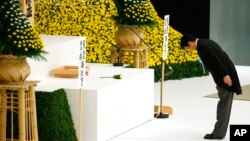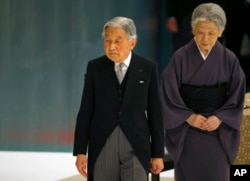Japanese Prime Minister Shinzo Abe has sent a ritual offering to a controversial war shrine, a move likely to upset many Chinese and Koreans already irate over what they see as the conservative Japanese leader's inadequate apology for wartime atrocities.
Local media reported Abe sent a cash offering to the Yasukuni Shrine on Saturday, the 70th anniversary of Japan's defeat by Allied forces in World War Two. The Tokyo shrine honors 14 Japanese war criminals along with 2.5 million other Japanese war dead.
Japan is marking the anniversary with a series of memorial services and speeches, including one by Japanese Emperor Akihito, the son of wartime Emperor Hirohito.
"Together with deep remorse over the war, I pray this tragedy will not be repeated in the figure and together with the people, express my deep condolences for the war dead and those affected," the emperor said.
In a much-anticipated Friday speech, Abe expressed "utmost grief" for the "immeasurable damage and suffering" caused by Japan's past aggression. He also insisted that previous apologies issued by his predecessors would remain unshakeable.
But Abe also said future generations in Japan "who have nothing to do with that war" should not be forced to apologize. He also made what was largely seen as an oblique reference to Japan's use of women as sex slaves, known as "comfort women," during the war.
Regional reaction to the speech was largely negative.
South Korean President Park Geun-hye said Abe's comments "left much to be desired," but she said it was positive he reiterated that past government apologies will stand.
"I am focused on him clearly saying to the international community previous Cabinets' recognition of history will remain unshakeable," Park said.
She also expressed hope Tokyo will "solve the issues related to comfort women quickly and properly."
North Korea called the speech an "unpardonable mockery of the Korean people and an act of deceiving the international community," according to a Foreign Ministry statement published by the official Korean Central News Agency.
China's Foreign Ministry said the prime minister should have made "a sincere apology to the people of victim countries, and made a clean break with the past of militarist aggression, rather than being evasive on this major issue of principle."
The U.S., a close ally of Japan, welcomed Abe's "expression of deep remorse for the suffering caused by Japan during the World War Two era, as well as his commitment to uphold past Japanese government statements on history," according to a White House statement.
"We also value Prime Minister Abe's assurances of Japan's intent to expand upon its contributions to international peace and prosperity in the years ahead," the statement read.
Although Abe is not expected to visit the Yasukuni shrine, at least two of his Cabinet ministers did so on Saturday. Scores of Japanese lawmakers are also expected to attend.







